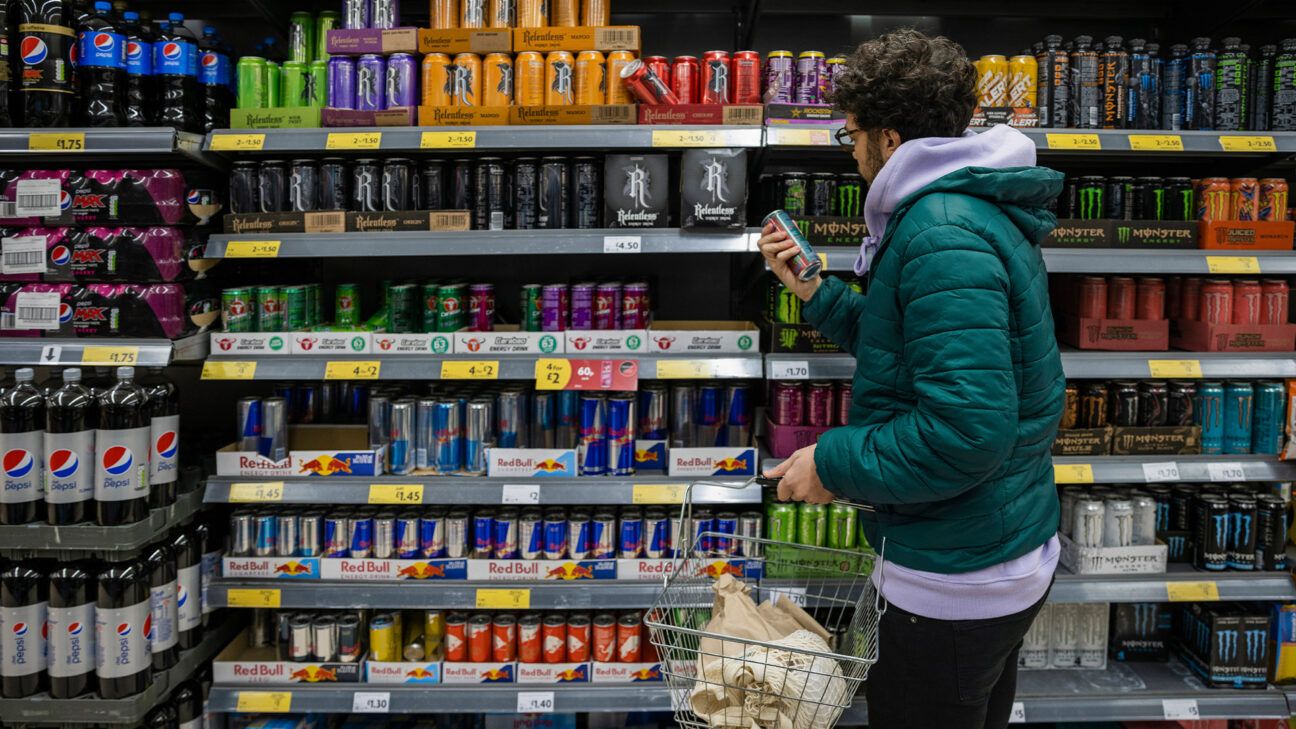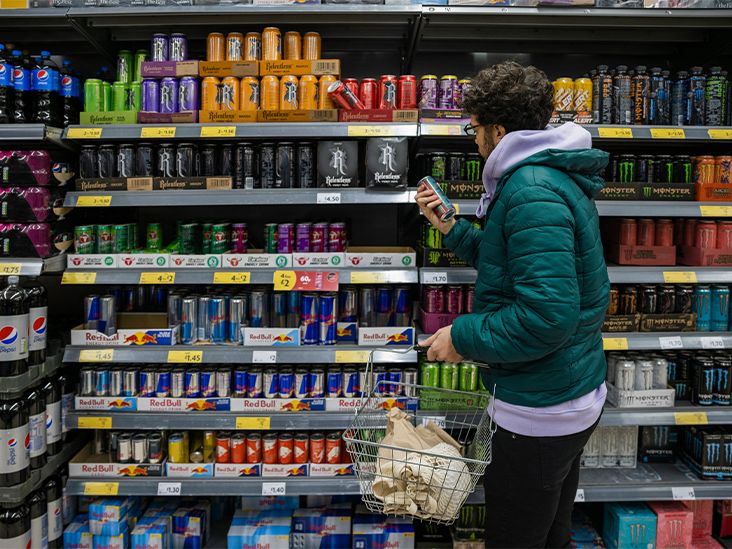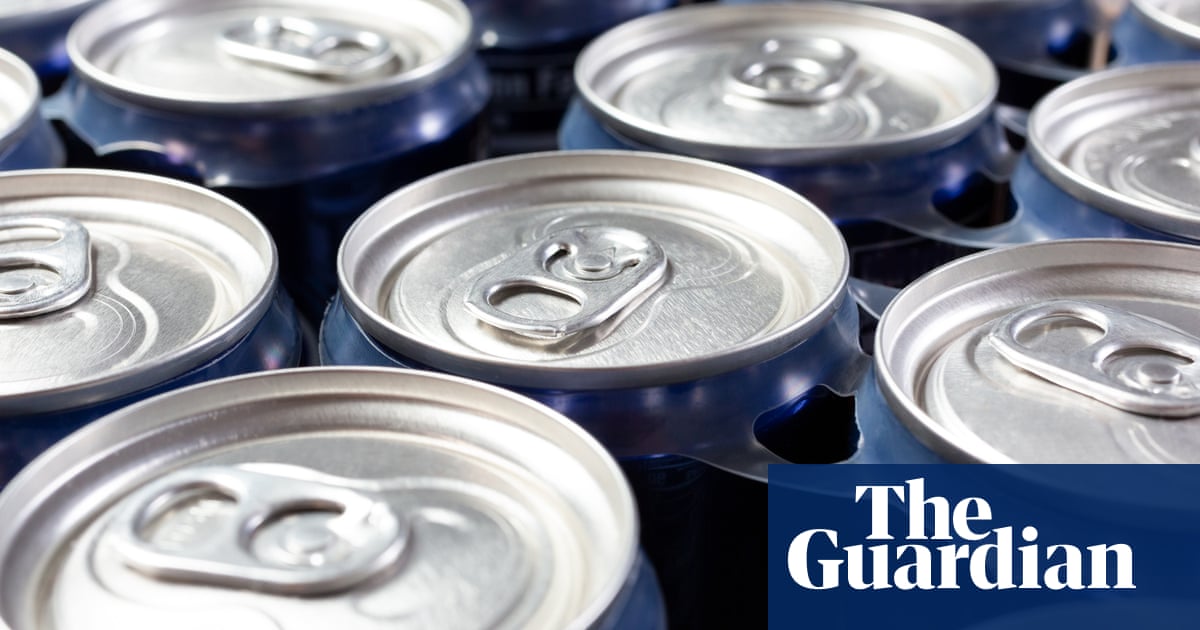Drinking soda and artificially sweetened beverages increases the risk of serious heart conditions, a new study says. The research found that consuming more than two liters of diet soda or other artificially sweetened drinks per week could increase the risk of atrial fibrillation by 20% compared with people who drink none. Similarly, drinking one liter or less per week of pure juice was linked to an 8% reduced risk of atrial fibrillation.
Soda and Artificially Sweetened Beverages Increase Heart Disease Risk, Study Finds
Consuming more than two liters of diet soda or other artificially sweetened drinks per week could increase the risk of atrial fibrillation by 20% compared with people who drink none.
Drinking one liter or less per week of pure juice was linked to an 8% reduced risk of atrial fibrillation.
Drinking soda and artificially sweetened beverages increases the risk of serious heart conditions.






Confidence
80%
Doubts
- It's not clear if other factors, such as a healthy diet and exercise, were taken into account in the study.
Sources
64%
Artificially sweetened drinks linked to risk of irregular heartbeat, study finds
theguardian.com Article URL: https://www.theguardian.com/world/2024/feb/13/ pakistan-·coalition-·agrees-to-form-government Erum Salam Tuesday, 05 March 2024 19:20Unique Points
- Consuming more than two liters of diet soda or other artificially sweetened drinks a week could increase the risk of a dangerous irregular heartbeat by 20% compared with people who drink none.
- People who drink such beverages could be more susceptible to atrial fibrillation, which is characterized by symptoms like fatigue, shortness of breath and palpitations.
- Atrial fibrillation can lead to blood clots, strokes and other heart-related complications.
- The US Centers for Disease Control and Prevention says stroke is a leading cause of serious long-term disability.
- Those above 65 are at greater risk for heart conditions such as A-fib and stroke, making it more important for this group to follow a healthy lifestyle and avoid artificially sweetened drinks.
- The study also looked at added-sugar beverages like soda and pure unsweetened juices, finding that added sugar was associated with an increased risk of A-fib by 10%, while drinking roughly four ounces of pure unsweetened juice lowered the risk by 8%.
- Penny Kris-Etherton, a nutritional sciences professor at Penn State University said this is the first study to report an association between no and low calorie sweeteners and sugar-sweetened beverages with increased risk of A-fib.
- Maglione advised that making sure blood pressure is optimized, following a heart-healthy lifestyle, avoiding foods high in cholesterol and fat, doing regular exercise are key to managing atrial fibrillation.
- Even modest weight loss has been associated with much lower recurrence rates of A-fib after treatment.
- Maglione also said there was some evidence linking atrial fibrillation to early dementia later in life.
Accuracy
No Contradictions at Time Of Publication
Deception (30%)
The article is deceptive in several ways. Firstly, the author claims that people who drink artificially sweetened drinks could be more susceptible to a condition known as atrial fibrillation. However, this claim is not supported by any evidence presented in the article. The study only found an association between consuming more than two liters of diet soda or other artificially sweetened drinks per week and a 20% increased risk of irregular heartbeat compared to people who drink none. This does not imply that drinking these beverages causes atrial fibrillation, but rather that it may increase the likelihood of developing this condition in some individuals. Secondly, the author quotes Theodore Maglione as stating that A-fib can often be genetic and age is a big risk factor for this condition. However, he also states that there are modifiable risk factors such as smoking, hypertension, uncontrolled sleep apnea, obesity and nutrition. This contradicts the idea that A-fib is solely determined by genetics or age. Lastly, the article suggests that diet soda may not be any healthier than conventional for-calorie sodas when it comes to heart health. However, this claim is also unsupported by any evidence presented in the article.- The author claims that people who drink artificially sweetened drinks could be more susceptible to a condition known as atrial fibrillation. However, this claim is not supported by any evidence presented in the article.
Fallacies (75%)
The article contains several fallacies. The author uses an appeal to authority by citing a study without providing any context or information about the researchers' qualifications or methodology. Additionally, the author quotes experts who provide conflicting information on whether artificial sweeteners are harmful to health. This creates confusion and undermines the credibility of their claims.- The article cites a study without providing any context or information about the researchers' qualifications or methodology.
Bias (80%)
The article contains a statement that consuming more than two liters of diet soda or other artificially sweetened drinks a week could increase the risk of irregular heartbeat by 20% compared with people who drink none. This is an example of monetary bias as it implies that there are financial incentives for companies to produce and market these products, which may lead to them downplaying or ignoring potential health risks.- Consuming more than two liters of diet soda or other artificially sweetened drinks a week could increase the risk of irregular heartbeat by 20% compared with people who drink none.
Site Conflicts Of Interest (50%)
None Found At Time Of Publication
Author Conflicts Of Interest (50%)
The author has a conflict of interest on the topic of artificially sweetened drinks and their link to irregular heartbeat. The article mentions that Robert Wood Johnson University hospital in New Jersey is one of the largest funders for research into dietary sugars and obesity. This financial tie could compromise the objectivity and impartiality of the author's reporting on this topic.- The article mentions that Robert Wood Johnson University hospital is one of the largest funders for research into dietary sugars and obesity.
- The article states, 'Robert Wood Johnson University Hospital in New Jersey has been a major funder of research into dietary sugars and obesity.'
79%
Drinking Soda and Artificially Sweetened Beverages Increase Risk of Serious Heart Condition, Study Says
People Magazine Friday, 08 March 2024 15:12Unique Points
- Consuming more than two liters of diet soda or other artificially sweetened drinks a week could increase the risk of a dangerous irregular heartbeat by 20% compared with people who drink none.
- Drinking one liter or less per week of pure juice was linked with an 8% reduced risk of atrial fibrillation.
Accuracy
- ,
- Drinking diet or sugary beverages may lead up to a 20% increased risk of AFib.
Deception (30%)
The article is deceptive in several ways. Firstly, it states that drinking two liters or more of diet soda per week can increase your risk of developing atrial fibrillation. However, the study only found a correlation between consuming more than two liters of artificially sweetened drinks and an increased risk of developing atrial fibrillation. The article also states that other beverages with added sugars increased the risk of the disease by 10%. This is not accurate as there are many factors that contribute to the development of atrial fibrillation, including genetics, lifestyle choices and medical conditions. Additionally, while this study suggests a correlation between drinking diet soda and developing atrial fibrillation, another study from 2017 found that people with European ancestry have a 22% risk of inheriting the condition. This contradicts the claim made in this article that consuming diet soda can increase your risk of developing atrial fibrillation. Finally, while it is recommended to reduce or avoid artificially sweetened and sugar-sweetened beverages whenever possible, there are many other factors that contribute to heart disease such as smoking, lack of exercise and a poor diet.- The article states that drinking two liters or more of diet soda per week can increase your risk of developing atrial fibrillation. However, the study only found a correlation between consuming more than two liters of artificially sweetened drinks and an increased risk of developing atrial fibrillation.
- The article states that other beverages with added sugars increased the risk of the disease by 10%. This is not accurate as there are many factors that contribute to the development of atrial fibrillation, including genetics, lifestyle choices and medical conditions.
Fallacies (100%)
None Found At Time Of Publication
Bias (85%)
The article contains a statement that individuals who consume more than two liters of artificially sweetened drinks are 20% more likely to develop atrial fibrillation. This is an example of religious bias as the author implies that consuming these beverages goes against natural and healthy eating habits.- The study, published Tuesday in the journal Circulation: Arrhythmia and Electrophysiology, examined approximately 202,000 people from the United Kingdom aged 37 to 73. Researchers found that individuals who consumed more than two liters of artificially sweetened drinks were 20% more likely to develop atrial fibrillation.
Site Conflicts Of Interest (100%)
None Found At Time Of Publication
Author Conflicts Of Interest (0%)
None Found At Time Of Publication
70%
Both Diet and Sugary Drinks Linked to Increased AFib Risk, What to Know
Healthline Media Inc. Kaitlin Vogel Friday, 08 March 2024 15:13Unique Points
- Drinking diet or sugary beverages may lead up to a 20% increased risk of AFib.
- High sugar beverage consumption can cause elevated blood pressure, which is a contributing factor for AFib.
- Consuming one liter or less per week of pure juice was linked with an 8% reduced risk of atrial fibrillation.
Accuracy
- Consuming more than two liters of diet soda or other artificially sweetened drinks a week could increase the risk of a dangerous irregular heartbeat by 20% compared with people who drink none.
Deception (50%)
The article is deceptive in several ways. Firstly, it states that drinking diet or sugary beverages may lead up to a 20% increased risk of AFib. However, the study only found an association between consuming more than two liters per week of either artificially sweetened or sugary drinks and an increased risk of incident atrial fibrillation (AFib). The article also states that high sugar beverage consumption is associated with insulin resistance, type 2 diabetes mellitus, weight gain/obesity, fatty liver, and elevated blood pressure. However, the study only found a correlation between these factors and AFib risk.- The article states that drinking diet or sugary beverages may lead up to a 20% increased risk of AFib. This is deceptive because the study only found an association between consuming more than two liters per week of either artificially sweetened or sugary drinks and an increased risk of incident atrial fibrillation (AFib).
- The article states that high sugar beverage consumption can cause elevated blood pressure, which is a contributing factor for AFib. However, the study only found a correlation between these factors and AFib risk.
Fallacies (85%)
The article contains several fallacies. The author uses an appeal to authority by citing a study without providing any context or information about the researchers involved in the study. Additionally, there is no evidence presented that supports the claim that artificially sweetened drinks are healthier than sugar-sweetened beverages.- The article contains several fallacies.
Bias (85%)
The article contains examples of both ideological and religious bias. The author uses language that dehumanizes those who consume sugar-sweetened beverages by referring to them as 'high sugar beverage consumption' which implies they are making a poor choice rather than simply consuming something they enjoy. Additionally, the author quotes Dr Ningjian Wang saying 'Individuals should be aware of the health risks associated with consuming sweetened beverages', implying that those who consume these drinks are not already aware of their potential negative effects on health.- Dr Ningjian Wang quotes saying 'Individuals should be aware of the health risks associated with consuming sweetened beverages'
- The article uses language that dehumanizes those who consume sugar-sweetened beverages by referring to them as 'high sugar beverage consumption'
Site Conflicts Of Interest (50%)
None Found At Time Of Publication
Author Conflicts Of Interest (50%)
The author has a conflict of interest on the topic of AFib risk as they are affiliated with Shanghai Jiao Tong University School of Medicine in Shanghai, China. The article also mentions Professor John A. Higgins from the University of California, San Francisco who is not disclosed to have any conflicts.- The author's affiliation with Shanghai Jiao Tong University School of Medicine in Shanghai, China may compromise their ability to report on AFib risk objectively.
66%
Just 2 cans of soda per week is too much — even if you exercise: study
New York Post Hannah Sparks Sunday, 03 March 2024 21:05Unique Points
- Workouts are rendered worthless by soda consumption.
- The damage done by sugar-sweetened beverages can't be overcome with the average recommended workout quota (about 150 minutes every week).
- Two sodas every seven days could be considered relatively low by many consumers yet still presented significant health risks.
Accuracy
- Consuming more than two liters of diet soda or other artificially sweetened drinks a week could increase the risk of a dangerous irregular heartbeat by 20% compared with people who drink none.
Deception (30%)
The article is deceptive in several ways. Firstly, it implies that soda consumption can be balanced out by exercise when the study shows otherwise. Secondly, it uses sensationalist language such as 'worthless' and 'erased' to make the reader believe that drinking just two cans of soda per week is catastrophic for their health. Thirdly, it quotes a researcher saying that sugary drink consumption has no negative effects on health if you are physically active which contradicts the study findings.- Workouts are rendered worthless by soda consumption
- Drinking just two 12-ounce cans of pop per week can effectively erase the heart health gains made during exercise
Fallacies (85%)
The article contains several fallacies. Firstly, the author uses an appeal to authority by citing a study published in the American Journal of Clinical Nutrition as evidence for their claims. However, this study is not cited or linked within the article itself and therefore cannot be verified independently. Secondly, there are multiple instances where inflammatory rhetoric is used to create a sense of urgency around avoiding soda consumption altogether, which can be seen as an attempt to manipulate readers' emotions rather than presenting objective information. Lastly, the author uses dichotomous depiction by stating that physical activity reduces the risk of cardiovascular disease associated with sugar-sweetened beverages by half but does not fully eliminate it.- Drinking just two 12-ounce cans of pop per week can effectively erase the heart health gains made during exercise, according to a new study published in the American Journal of Clinical Nutrition.
Bias (85%)
The article presents a biased view of the relationship between soda consumption and exercise. The author uses language that implies that drinking just two cans of soda per week is harmful to heart health even if you exercise regularly. This statement contradicts previous research which has shown that moderate consumption of sugar-sweetened beverages does not have a significant negative impact on cardiovascular disease when consumed in moderation and as part of an overall healthy diet. The author also uses language that implies that the marketing strategies for these drinks often show active people drinking these beverages, which suggests that sugary drink consumption has no negative effects on health if you're physically active. This is not supported by previous research which has shown a clear link between soda consumption and an increased risk of obesity, type 2 diabetes, and cardiovascular disease. The author also uses language that implies that the recommended workout quota of 150 minutes per week is not enough to mitigate the dangers of soda consumption. This statement contradicts previous research which has shown that regular physical activity can help reduce the risk of chronic diseases such as obesity, type 2 diabetes, and cardiovascular disease.- Drinking just two 12-ounce cans of pop per week can effectively erase the heart health gains made during exercise
- Physical activity reduces the risk of cardiovascular disease associated with sugar-sweetened beverages by half, but it does not fully eliminate it
- Workouts are rendered worthless by soda consumption
Site Conflicts Of Interest (50%)
The article by Hannah Sparks published on March 3rd, 2024 in the New York Post has several examples of conflicts of interest. The author is affiliated with Université Laval in Quebec City and Jean-Philippe Drouin-Chartier who conducted the study mentioned in the article is also associated with this university.- Hannah Sparks, a journalist for South West News Service, has an affiliation with Université Laval through her reporting on their research. The author of the study mentioned in the article, Jean-Philippe Drouin-Chartier is also associated with this university.
- The article mentions that Jean-Philippe Drouin-Chartier conducted a study at Université Laval which raises questions about potential conflicts of interest between his affiliation with the university and his research findings.
Author Conflicts Of Interest (50%)
None Found At Time Of Publication